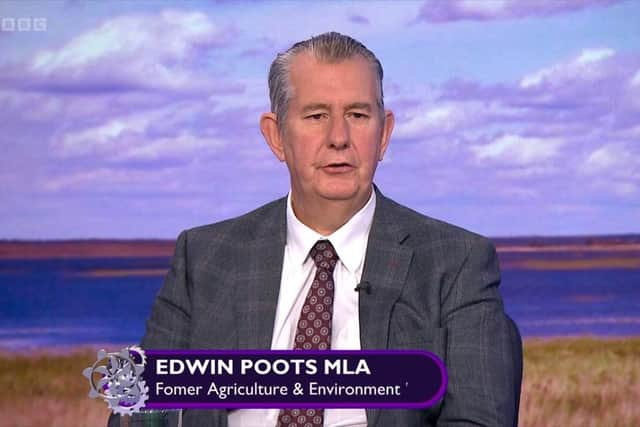Something seismic needed to break deadlock on Stormont says former DUP leader Edwin Poots
and live on Freeview channel 276
Former leader Edwin Poots said what was on the table at present was “nowhere near” enough to convince his party to end its blockade on devolution at Stormont.
The DUP has been blocking power-sharing for more than a year in protest at the internal UK trade barriers created by Brexit's contentious Northern Ireland Protocol.
Advertisement
Hide AdAdvertisement
Hide AdThe party says the deal struck by the EU and UK to reform the protocol – the Windsor Framework – does not sufficiently address its concerns and has made clear it will not countenance a return to devolution until the government provides further assurances, by way of legislation, over Northern Ireland's place within the UK internal market.


Talks between the DUP and government have been ongoing over the summer and Northern Ireland Secretary Chris Heaton Harris has insisted significant progress has been made.
There are differing views within the DUP, with some influential party figures apparently more keen than others to drop the boycott and return to a ministerial executive.
Mr Poots said he wanted to see Stormont return but warned the government it needed to offer more.
Advertisement
Hide AdAdvertisement
Hide Ad“I think that we need to see something seismic coming from Downing Street and it's going to take something significant to make that happen,” he told BBC NI's ‘Sunday Politics’ programme.
“I very much want it to happen. However, what has been on the table heretofore is nowhere near adequate to bring the DUP back into the room.”
Sinn Fein and the other main Stormont parties have long been calling on the DUP to return to the assembly and executive to address a major funding crisis with public services in the province.
On Friday, Sinn Fein vice president Michelle O'Neill said the DUP was dragging out its blockade of power-sharing in the pursuit of something that looks impossible to achieve.
Advertisement
Hide AdAdvertisement
Hide AdShe said last week's major investment conference in Northern Ireland demonstrated the huge economic potential of the province, but that a functioning ministerial executive was required to fully harness those opportunities.
“Clearly, we know that the DUP are in negotiations with the British government, but they have been for some time, and they need to get on with it because while they are sitting off trying to maybe achieve something that is impossible, the public are suffering,” she told the PA news agency.
“I hope that we can get a resolution. I believe in a restored executive. I think that we've been far too long out of the executive. But I hope that we can get to a point where the DUP do end that blockade and get into the executive with the rest of us.
“I think the investment conference this week shows that we have huge economic potential to create more and better jobs. But we need an executive up and running to really harness that.”
Advertisement
Hide AdAdvertisement
Hide AdLast week it was reported that London is thinking of taking full control of implementing the Windsor Framework due to the absence of Stormont.
The Northern Ireland Office (NIO) and Downing Street are said to be looking at options for how Britain can implement its deal with Brussels.
The government is said to be flirting with the idea of returning Stormont in such a way that a devolved minister could decline to implement the framework, in which case Westminster would do so.
This would circumvent unionist fears that a return to power-sharing will mean implementing the Irish Sea border.
Advertisement
Hide AdAdvertisement
Hide AdWhile such an arrangement will be welcomed by some moderate unionists, it is believed to have gone down badly with the DUP.
Mr Heaton-Harris’s claim of “substantial” progress has also been disputed by key figures in the biggest unionist party, who say that no such progress has been made in the way that they want, which is further UK-EU talks over the Irish Sea border.